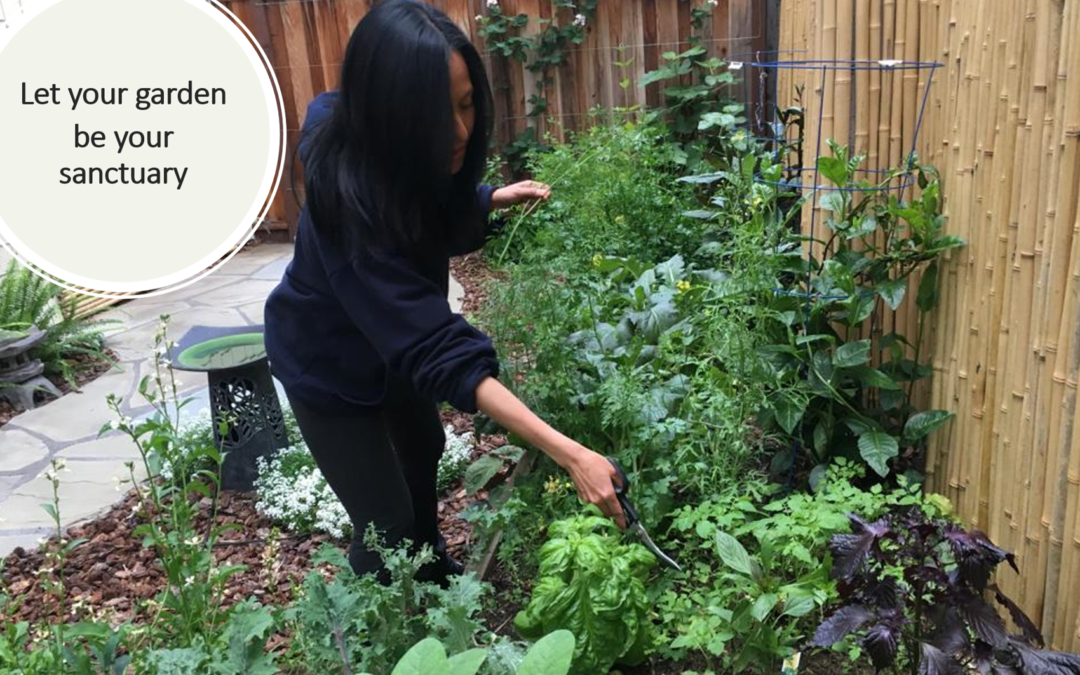As discussed in my last blog “Embrace the Nature … It is Good for You!”, the health benefits of spending time in the nature or nature therapy are well demonstrated by scientific research.
Such health benefits include improved mood and mental health, reduced stress, improved medical recovery, pain management and immune health, and reduced risks of chronic diseases (including heart disease, diabetes, cancers, etc.).
Gardening is probably one of the most common ways to interact with nature. It is a popular pastime and can be used as a form of nature therapy.
Gardening is not restricted to those who have land space at their home. Gardening can also be performed at community gardens, school gardens, etc. In the U.S., it is estimated that one in three people participate in gardening activities.2
Numerous clinical studies have shown the various health benefits of gardening, as depicted below. In addition, the health benefits of gardening were demonstrated for all age groups (children, adolescents, adults, elderly).4–6
Hence, horticultural therapy (HT), a therapeutic approach through gardening activities, exposure to plants and closeness to nature, has increasingly been recognized as a cost-effective health intervention.1,2
Mental health benefits of gardening and HT include:1–6
- Improve mood state and emotional well-being.
- Reduce anxiety and stress.
- Improve self-esteem and reduced behavioral and emotional difficulties in children and adolescents.
- Reduce depression.
- Improve engagement, mood, sleep and cognitive issues in dementia patients.
- Increase life satisfaction, quality of life, family connection and sense of community (especially in the case of community garden).
- Useful general treatment for mental health issues.
- Useful in substance abuse treatment, when integrating with other therapy.
Physical health benefits of gardening and HT include: 1–6
- Increase physical activity levels and reduce body mass index (BMI).
- Reduce stress hormone (cortisol) and stress-related health issues.
- Reduce risk factors of heart disease.
- Increase consumption of fruits and vegetables and promote healthy dietary habits.
In addition to instantaneous and more observable benefits such as improved mood and mental states, gardening and HT have also been shown to have cumulative and persistent health benefits when done regularly.
Related Articles
Embrace the Nature … It is Good for You!
References
- Summers J, Vivian D. Ecotherapy – A Forgotten Ecosystem Service: A Review. Front Psychol. 2018;9. doi:10.3389/fpsyg.2018.01389
- Soga M, Gaston K, Yamaura Y. Gardening is beneficial for health: A meta-analysis. Prev Med Rep. 2017;5:92-99. doi:10.1016/j.pmedr.2016.11.007
- Shanahan DF, Astell-Burt T, Barber EA, et al. Nature-Based Interventions for Improving Health and Wellbeing: The Purpose, the People and the Outcomes. Sports (Basel). 2019;7(6):141. Published 2019 Jun 10. doi:10.3390/sports7060141
- van Lier L, Utter J, Denny S, Lucassen M, Dyson B, Clark T. Home Gardening and the Health and Well-Being of Adolescents. Health Promot Pract. 2016;18(1):34-43. doi:10.1177/1524839916673606
- Ohly H, Gentry S, Wigglesworth R, Bethel A, Lovell R, Garside R. A systematic review of the health and well-being impacts of school gardening: synthesis of quantitative and qualitative evidence [published correction appears in BMC Public Health. 2016 Oct 5;16(1):1051]. BMC Public Health. 2016;16:286. Published 2016 Mar 25. doi:10.1186/s12889-016-2941-0
- Machida D. Relationship between Community or Home Gardening and Health of the Elderly: A Web-Based Cross-Sectional Survey in Japan. Int J Environ Res Public Health. 2019;16(8):1389. Published 2019 Apr 17. doi:10.3390/ijerph16081389

